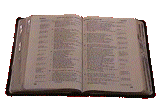

Psalm 16
I. JOY IN PRESENT DISTRESS, 1– 8
1.1 David here
flies to God's protection with a cheerful believing confidence in it (v.
1)
1.2 He
recognizes his solemn dedication of himself to God as his God (v. 2)
1.3 He devotes himself to the honor of God in the service of the
saints (v. 2, 3)
1.4 He disclaims the worship of all false gods and all communion
with their worshippers, v. 4.
1.5 He repeats the solemn choice he had made of God for his
portion and happiness (v. 5), takes to himself the comfort of the choice (v.
6), and gives God the glory of it, v. 7. This is very
much the language of a devout and pious soul in its gracious exercises.
16:8 Because
the Lord Himself was the main focus of David's attention and satisfaction, he
knew no one would shake him in any major way from his stability in life (cf.
15:5c). (…)
II. CONFIDENCE IN FUTURE
DELIVERANCE,
9–11
2.1 Peter
quoted verses 8-11 on the day of Pentecost as a messianic prophecy (Acts
2:25-28). These words were true of Jesus Christ. hey apply to Him. (read more: http://www.soniclight.com/constable/notes/pdf/psalms.pdf )
All these verses are quoted by St. Peter in his first sermon, after the
pouring out of the Spirit on the day of pentecost (Acts 2:25-28); and he tells us expressly that David in
them speaks concerning Christ and particularly of his resurrection. (read
more:
Source:
1) Blue Letter Bible
2) Dr. Constable's Notes on Psalms
Psalm 16 New American Bible (Revised Edition) (NABRE)
Footnotes:
Psalm 16 In the first section, the psalmist
rejects the futile worship of false gods (Ps 16:2–5), preferring
Israel’s God (Ps 16:1), the giver of
the land (Ps 16:6). The
second section reflects on the wise and life-giving presence of God (Ps 16:7–11).
16:1 Miktam:
a term occurring six times in Psalm superscriptions, always with “David.” Its
meaning is unknown.
16:4 Take
their names: to use the gods’ names in oaths and hence to affirm them as one’s
own gods.
16:6 Pleasant
places were measured out for me: the psalmist is pleased with the plot of land
measured out to the family, which was to be passed on to succeeding generations
(“my inheritance”).
16:10 Nor
let your devout one see the pit: Hebrew shahath means here the pit, a
synonym for Sheol, the underworld. The Greek translation derives the word here
and elsewhere from the verb shahath, “to be corrupt.” On the basis of the
Greek, Acts 2:25–32; 13:35–37 apply
the verse to Christ’s resurrection, “Nor will you suffer your holy one to see
corruption.”
Bible Dictionaries
ISBE Main Index:
The ISBE is part of SwordSearcher Bible Software.
 .
.My Pages











Nenhum comentário:
Postar um comentário